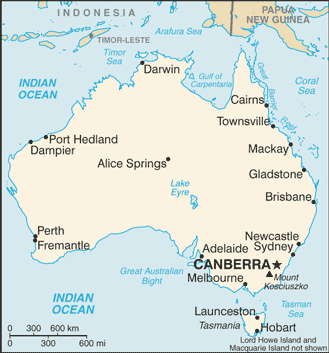The definition of a city in Australia varies between the states. State capital cities may include multiple local government areas (LGAs) within their boundaries and these LGAs may be cities in their own right. Cities listed below are those as defined by the states in which they are located. Also included are former cities that have lost city status due to LGA amalgamations or other factors.

Australian Capital Territory
- Canberra (national and territory capital city)
New South Wales
Since 1993, only local government areas in New South Wales can be declared as "cities" by the Government, under the Local Government Act 1993.[1] Although the present version of the Act specifies no criteria for city status,[2] a previous version of the Act specified that to be a city, a Council area must:
- (a) have a population of at least 25,000 persons and be an independent centre of population; not being a suburb, whether residential, industrial, commercial or maritime, of any other council area or centre of population; or
- (b) have a population of at least 150,000, and have a distinct character and entity as a centre of population beyond what would normally be regarded as being of local or suburban significance only; or
- (c) satisfy the criteria specified in paragraphs (a) or (b) apart from the population criteria, and be a homogenous centre of importance as a focus of regional commercial, governmental or cultural activity beyond that which would normally be regarded as local, suburban, or subsidiary to another nearby centre.[3]
New South Wales, therefore, has two types of "city": cities that are acknowledged on the register of the Geographical Names Board of New South Wales,[4] and local government areas that have been proclaimed as cities but are not acknowledged on the Geographical Names Register.
Cities acknowledged on the NSW Geographical Names Register
Cities not acknowledged on the NSW Geographical Names Register
This list includes local government areas inside the Sydney metropolitan area but excludes cities also acknowledged on the Geographical Names Register:
Former local government areas that were accorded city status (however since amalgamated) include:
- City of Bankstown[a] (1980)
- City of Botany Bay (1995)
- City of Canterbury (1990)
- City of Dubbo (1966)
- City of Gosford (1979)
- City of Greater Taree (1980)
- City of Holroyd (1990)
- City of Hurstville (1988)
- City of Queanbeyan (1972)
- City of Rockdale (1995)
Northern Territory
- Darwin (territory capital)
- Palmerston
Queensland
Other towns or suburban areas whose local government was accorded city status (including those since amalgamated) include:
South Australia
Tasmania
- Hobart (state capital), the metropolitan area of which consists of the City of Clarence, City of Hobart, and the City of Glenorchy
- Burnie
- Devonport
- Launceston
Victoria
Western Australia
Local government areas with city status not listed above, all of which lie within Perth's metropolitan area, include:
See also
Notes
References
- ^ Local Government Act 1993 Archived 15 June 2016 at the Wayback Machine, Chapter 9 – "How are Councils Established?". Accessed via AUSTLII on 26 April 2007.
- ^ Robert Harrison MLA, Private Members' Statement: Proposed Shellharbour City Archived 29 September 2007 at the Wayback Machine, New South Wales Legislative Assembly, Hansard, 23 November 1995, p. 3960. Accessed 26 April 2007.
- ^ Garry West MLA, Questions on Notice: Hastings Council Name Change Archived 29 September 2007 at the Wayback Machine, New South Wales Legislative Assembly, Hansard, 19 November 1993, pp. 6008–9. Accessed 26 April 2007.
- ^ "Geographical Names Register Extract: List of placenames acknowledged as a CITY". Geographical Names Register (GNR) of NSW. Geographical Names Board of New South Wales. Archived from the original (.CSV) on 12 October 2016. Retrieved 31 August 2008.
- ^ "History of Griffith". Griffith City Council. Archived from the original on 26 July 2008. Retrieved 19 August 2008.